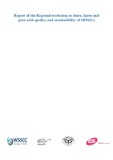| dc.contributor.author | Water Supply and Sanitation Collaborative (WSSCC) | |
| dc.contributor.author | Institute of Development Studies (IDS) | |
| dc.contributor.author | Divisional Swachh Bharat Team, Moradabad | |
| dc.coverage.spatial | India | en |
| dc.date.accessioned | 2020-08-06T12:00:13Z | |
| dc.date.available | 2020-08-06T12:00:13Z | |
| dc.date.issued | 2017-09-13 | |
| dc.identifier.citation | Divisional Swachh Bharat Team Moradabad, Water Supply and Sanitation Collaborative Council & Institute of Development Studies (2017) 'Report of the Regional Workshop to Share, Learn and Plan with Quality and Sustainability of Swachh Bharat Mission (Gramin) (SBM-G)', Brighton: Institute of Development Studies | en |
| dc.identifier.uri | https://opendocs.ids.ac.uk/opendocs/handle/20.500.12413/15568 | |
| dc.description.abstract | This Regional Workshop to share, learn and plan with quality and sustainability in the context of Swachh Bharat Mission (Gramin) was held at Moradabad division on 11th to 13th September 2017, with 103 participants from 9 districts of Uttar Pradesh. The workshop was designed to provide and facilitate a learning platform for sharing experiences and ideas between Districts.
The key learning identified by participants included: the need for and use of a variety of change agents including local leaders, medical practitioners, religious leaders, women and Self-Help Groups, adolescent girls, children, Swachhagrahis, Anganwadi workers and others; in all districts, more work is needed for the disabled; the importance of high quality CLTS facilitators - maintaining the quality of the CLTS process was listed as a challenge and some may need to undergo refresher training; masons may need refresher training focusing on the benefits of twin-pits, ways they can promote them and do’s and don’ts during construction; the benefit of different IEC ideas such as films, local videos, paintings, community-wide events beyond triggering, utilising local festivals etc; strengthening supply chains through the establishment of supply chain specific committees at District, Block and GP level; the importance of putting those with disabilities, the marginalised and most vulnerable on the top of any beneficiary list; the need for regular sanitation related meetings at village level involving District, Tehsil, Block and GP level staff and to continue these after villages reach ODF; the benefits of the rural pan to save water. | en |
| dc.description.sponsorship | Funded by the Swedish International Development Cooperation (Sida). | en |
| dc.language.iso | en | en |
| dc.publisher | Institute of Development Studies | en |
| dc.rights.uri | http://creativecommons.org/licenses/by-nc-nd/3.0/ | en |
| dc.subject | Environment | en |
| dc.subject | Participation | en |
| dc.title | Report of the Regional Workshop to Share, Learn and Plan with Quality and Sustainability of Swachh Bharat Mission (Gramin) (SBM-G) | en |
| dc.type | Other | en |
| dc.rights.holder | Institute of Development Studies | en |
| dc.identifier.externaluri | https://sanitationlearninghub.org/?post_type=resource&p=1898&preview=true | en |
| dc.identifier.team | Participation | en |
| dcterms.dateAccepted | 2017-09-13 | |
| rioxxterms.funder | Default funder | en |
| rioxxterms.identifier.project | The Sanitation Learning Hub | en |
| rioxxterms.version | NA | en |
| rioxxterms.funder.project | 5e50f69d-6102-4a66-b12d-49ceb02612b0 | en |


